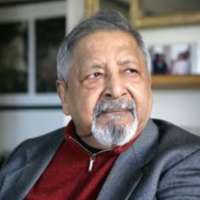Sir Vidiadhar Naipaul TC
Dublin Core
Title
Sir Vidiadhar Naipaul TC
Subject
arrival
Description
Sir Vidiadhar Surajprasad Naipaul TC, most commonly known as V. S. Naipaul, and informally, Vidia Naipaul, was a Trinidadian-British writer of works of fiction and nonfiction in English.
Vidiadhar Surajprasad Naipaul was born in rural Trinidad on 17 August 1932. The island of his birth was a complicated post-colonial patchwork of racial tensions and subtle hierarchies. His grandparents had been labourers: part of the great nineteenth-century Indian diaspora who had settled in the Caribbean. The young Vidia was raised as a Hindu, part of a displaced community within a plantation society. It was a blend of histories, customs and ethnic identities which later formed an important part of his work. Naipaul's father, Seepersad, was a journalist for the Trinidad Guardian who revered Shakespeare and Dickens. He would read the great works of European literature aloud to his children - giving the young Vidia a burning ambition for writing, a "fantasy of nobility" and a "panic about failing.".
He attended the Queen's Royal College, proving himself an able student. On graduating, he won a government scholarship giving him entry to the Commonwealth university of his choosing. In 1950, he arrived in Oxford. University College commencing a time of poverty and terrible loneliness. Isolated and unsure of his future, Naipaul became severely depressed
For his numerous critics, Naipaul's writing was troubling and even bigoted. They recognised his literary gifts but saw him as a hater: an “Uncle Tom” who dealt in stereotypes, paraded his prejudices and bathed in loathing for the world from which he came. They hailed him as a towering intellect - delivering an original, scorching critique refreshingly devoid of political correctness: attacking the cruelty of Islam, the corruption of Africa and the self-inflicted misery he witnessed in the poorest parts of the globe. For his many supporters, his fiction had merciless comic clarity and his travel writing a terrifying honesty - refusing to glamorise or idealise the developing world, to his detractors, Naipaul was essentially political; bearing witness against the post-colonial world with great writing but shielded from criticism by virtue of being 'one of them'.
In his later years, he entered an autumnal phase with The Enigma of Arrival (1987) and A Way in the World (1994), combining personal experience (though denying it was autobiographical) with the broad historical sweep of post-war migration from developing world. A knighthood followed. And In 2001, he received the Nobel Prize for Literature. The Academy compared him to Joseph Conrad and extolled his ability to "transform rage into precision."
Source
stories,arrival
Date
1950
Type
Story
Identifier
6213
Spatial Coverage
current,51.7406361640977,-1.2469482421875002;origin,10.50131507073086,-61.23229980468751;
Europeana
Europeana Type
TEXT
Story Item Type Metadata
End Date
1950
Citation
“Sir Vidiadhar Naipaul TC,” EU-LAC, accessed February 19, 2026, https://eu-lac.org/omeka/items/show/6707.
Embed
Copy the code below into your web page
